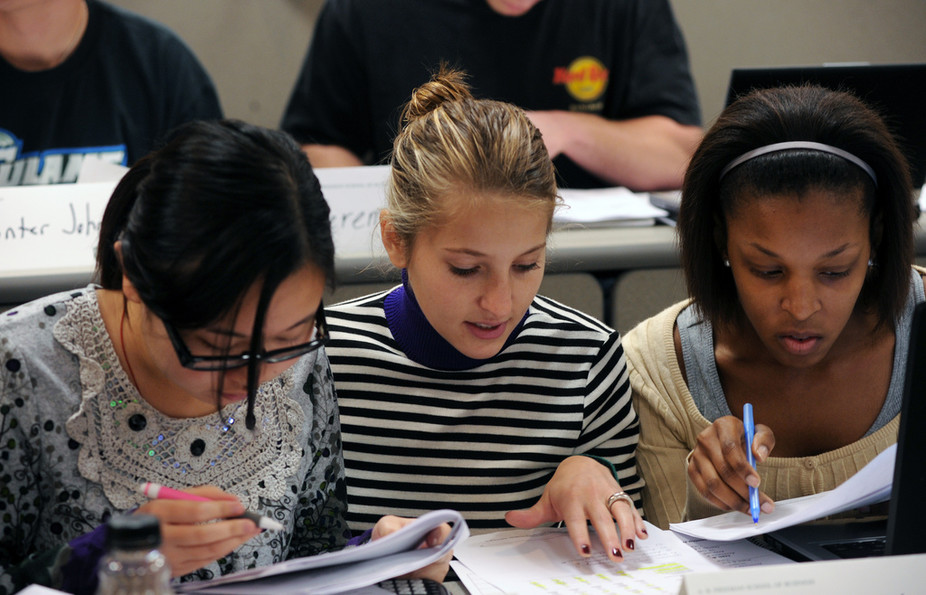10 TED Talks for Student Empowerment

The life of a student is not easy. Sometimes, the overwhelming task of solving arithmetic and keeping up with household chores makes creative thinking impossible for students. They need the motivation to come up with ideas. But their workload and the low motivation they get from their “uninspired” friends limit their potentials. While socializing on social networks can keep them busy, TED Talks has the vigor to spur them to action.
TED Talks, a media organization that offers inspirational videos from professional speakers on education, technology, business, and science is a good way to motivate students. You can share the educational speeches with your students and watch them take an interest in learning. We’ll be looking at ten (10) TED Talks that are suitable for the learning sphere.
Arianna Huffington’s “How to succeed? Get More Sleep”
Sometimes, students continue studies far into the night. In the long run, they fail to catch the recommended “7-hour sleep time”. Get your students motivated with Arianna’s perception of success. If a student must be productive and active in the classroom, he needs to have enough sleep high IQ and studying late into the night is not the only route to academic success; sleep is essential.
Brene Brown speaks on the “Power of Vulnerability”
Brene Brown, a research professor at the University of Houston in Texas, shares her thoughts on the vulnerability of humans. Students can draw inspiration from this and start looking at the greener side of life. By overcoming and converting their fears to challenges, students will be able to embrace their imperfections and work towards developing themselves.
John Green’s “The Nerd’s Guide to Learning Everything Online”
In the past decade, learning has slowly moved from the traditional classroom environment to the internet. John Green highlights his fears of learning in a traditional classroom and felt he needed more. After he came across the show, ‘The Show with Ze Frank”’ hosted by Ze Frank, John Green then took an interest in online learning. Students don’t necessarily need to be taught online learning. They can start by joining the community of learners on YouTube and Reddit and take their education to the next level.
Matt Cutts’ “TrySomething New for 30 Days”
Matt Cutts believes every new month is a challenge in the life of a student. The ability to go through the phase without hassles is what matters. He is of the opinion that every day counts, and students can make the best out of it. The idea is that the beginning of every 30-day cycle (a month) is an opportunity to start something new. Matt wrote a book within 30 days by using this idea. You can share this with your students and let them come up with ideas of what they can achieve in 30 days.
Derek Sivers wants to know if you’re “Weird, or just different?”
There are two perceptions of life: what we know to be true and what seems to be true. Derek opines that there’s a “flip side to everything.” There are times when different meanings can be gotten from a subject matter. Whatever assumptions you have, there is an opposite that is also true. For instance, doctors in China get rich when you’re healthy and not when you’re sick. This is because they feel they failed in their job when you get sick. You should let your students understand that whatever perception they have in life; no matter how people regard their approach to issues, there are elements of truth in such issues. Every student is unique. They’re not weird!
Lizzie Velasquez asks, “How do you define yourself?”
As students who are mostly in their adolescent age grow up, they often take the general perception of others. Lizzie Velasquez shares her story to motivate students to action. You can share her story of being bullied in her kindergarten with your students. Also, Lizzie’s visual impairment, inability to gain weight and blinded right eye did not stop her from working her way to success. If she can, your students can also overcome public backlash and attain the best in life.
Tim Urban talks on “Inside the Mind of a Master Procrastinator”
Everyone is a procrastinator, but the kinds differentiate these set of people. Procrastinators are in the danger of losing a lot than non-procrastinators. These individuals have a rational-decision making brain that lets them get productive or put things off. For procrastinators, they are held down by the “instant gratification monkey”; a feeling that compels them to take to fun than getting to work. Tim Urban opines that deadline-driven procrastination works in tandem with the panic monster to get people to work. For students, they stand a chance to be productive than waiting for the last minute.
Julian Treasure’s “5 Ways to Listen Better”
There is a tendency that some students in your classroom are not paying attention to the lesson. Even though they have their “eyes pricked,” they’re only able to pick out 25% of the lesson. Julian Treasure suggests five (5) techniques you can teach your students to get them more attentive in class. Teach them to pay attention to the speaker and look out for little noises or murmurs. Also, learn to summarize the lesson (preferable with the attention-inducing word “so’) and ask questions after the lesson.
Steven Johnson’s “Where Good Ideas come from.”
Steven Johnson disrupts the perception of “Eureka” – a mono inspiration model where an individual is the warehouse of information. Instead, he suggests places ideas can come from. A student can pick up the clue of writing a book after a discussion at the coffee shop. To illustrate this better, you can take on the workings of scientists. Scientists come up with new inventions after meeting and holding discussions. Would this have been possible if each scientist works alone? So, Steven Johnson is a tool to motive students. Teach them to discuss their ideas with a friend. A partnership is a key to idea generation.
J.K. Rowling is optimistic of “The Fringe Benefits of Failure”
Students are often jittery when they see “failure’ staring them in the face. It could be low grades in assessments or not meeting up with the public’s expectations. If J.K. Rowling could pull of great works, you can. Rowling believes that failure is only a stepping stone to success. She highlights her switching from a vocational degree to Classics. Her disposition in mastering her failures and building herself up is a great lesson you should share with your students.
Final Thoughts
The life of a student is filled with trials. From assessments to household chores, a student has little time to think about himself. These TED Talks will inspire them to do more. As a teacher, get them to understand the message each of these talks passes across and what they stand to gain when they practice it. There is no doubt that they will be inspired to put their best foot forward after you must have created innovative lessons with these talks.






